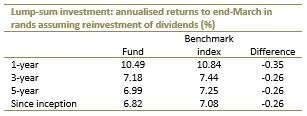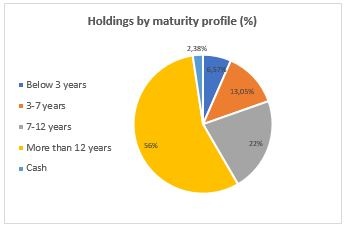Intellidex Reviews: NewFunds Govi ETF
Bonds add something different to your portfolio, and that alone is a good reason to hold them. Bonds have a very different risk return profile than equities, so they provide a way to spread your eggs over many baskets. NewFunds Govi provides exposure to SA’s investment-grade government bonds. Absa, the issuer of the exchange-traded fund (ETF), ensures that there is liquidity in the ETFs so it is easy to buy and sell them, unlike holding actual government bonds.
What it does
The NewFunds Govi ETF tracks the performance of the SA Government Bond Total Return Index (Govi). This index consists of bonds issued by the South African government, including only those issues in which National Treasury obliges the primary dealers to make a market. The Govi takes all bond issues by the SA government that fall into the top 10 positions of the all bond index (Albi). The selections for the Albi are based on average market capitalisation and liquidity, and only conventional listed bonds with a remaining life greater than one year throughout the quarter are eligible.
Performance review
The NewFunds Govi ETF performed well in the 12 months to end-March, returning 10.49%. This is a superior return when compared with other asset classes such as equities. The all share index managed only 3.9% in the same period.

Outlook
Government bonds are traditionally seen as a safe haven in turbulent times. This is largely because they are less volatile than stocks and research shows their prices often move in the opposite direction to equities. This makes them ideal for diversification. However, in SA that isn’t the case: in the past five years, prices of both asset classes have generally moved in the same direction, but the movements have a low correlation. Finance theory supports holding different asset classes in a portfolio as long as correlation is low or negative. Doing so helps ensure you minimise the riskiness of the portfolio for a given amount of return.
There are several factors that affect the value of bonds including the credit profile of the issuer, liquidity, maturity profile and interest rates. Government-issued bonds have a low risk profile so it is mainly interest rates that affect returns. Government bond yields have fallen gradually since the 2008 financial crisis, which means the prices of bonds have been trending upwards (in order for the effective yield to decline, prices have to increase so that the fixed cash flows equate to a lower yield on the initial price). However, in 2015, perceived political risk increased, which saw a sudden rise in yields and falling bond prices. The political environment remains uncertain and the interest rate outlook is mixed: after the downgrading of SA’s sovereign credit rating to junk by two international rating agencies, many expected the rand to weaken and interest rates to rise. However, the Reserve Bank’s Monetary Policy Committee surprised the markets this week by cutting the repo rate, in the context of SA’s economic recession and strong foreign fund flows. But the US and EU are looking to tighten monetary policy, which will put upward pressure on SA’s interest rates.
That said, the main attraction of bonds is their ability to reduce the risk in a portfolio of stocks. So, despite the negative outlook on the fundamental factors that affect their short-term prices, they remain an important, long-term component of a diversified portfolio.
Key facts:
Suitability
NewFunds Govi ETF is one of the four ETFs listed on the JSE that provide investors with low-cost exposure to fixed income securities. It is suitable for investors wanting to take on minimal risk, though bonds can vary in value in response to interest rates. They can also be used by an investor as a building block when constructing a core portfolio.

Top holdings: The fund is invested in bonds issued by the SA government with more than half of the bonds having maturities of 12 years or more. Longer maturities mean the bond portfolio is more responsive to interest rate changes.
Risks: The most common risks associated with fixed income securities are inflation risk, credit risk and interest rate risk. Fortunately, all the constituents of this fund are sovereign bonds issued by the SA government, which means credit risk is minimal. That said, the fund is still exposed to inflation risk and interest rate risk. Interest rate risk arises from fluctuating interest rates. As interest rates rise, bond prices fall and vice versa.

Alternatives
Retail investors seeking exposure to investment in fixed income assets have three other options: Ashburton Government Inflation ETF (total expense ratio: 0.47%); NewFunds ILBI ETF (TER: 0.35%); and Satrix ILBI (expected TER: 0.25%).
Background: Exchange-traded funds (ETFs)
Exchange-traded funds (ETFs) are passively managed investment funds that track the performance of a basket of pre-determined assets. They are traded the same way as shares and the main difference is that whereas one share gives exposure to one company, an ETF gives exposure to numerous companies in a single transaction. ETFs can be traded through your broker in the same way as shares, say, on the EasyEquities platform. In addition, they qualify for the tax-free savings account, where both capital and income gains accumulate tax free.
Benefits of ETFs
- Gain instant exposure to various underlying shares or bonds in one transaction
- They diversify risk because a single ETF holds various shares
- They are cost-effective
- They are liquid – it is usually easy to find a buyer or seller and they trade just like shares
- High transparency through daily published index constituents
If you thought this blog was interesting, you should also read:
Intellidex reviews: NewFunds Equity Momentum ETF
Disclaimer
This research report was issued by Intellidex (Pty) Ltd. Intellidex aims to deliver impartial and objective assessments of securities, companies or other subjects. This document is issued for information purposes only and is not an offer to purchase or sell investments or related financial instruments. Individuals should undertake their own analysis and/or seek professional advice based on their specific needs before purchasing or selling investments. The information contained in this report is based on sources that Intellidex believes to be reliable, but Intellidex makes no representations or warranties regarding the completeness, accuracy or reliability of any information, facts, estimates, forecasts or opinions contained in this document. The information, opinions, estimates, assumptions, target prices and forecasts could change at any time without prior notice. Intellidex is under no obligation to inform any recipient of this document of any such changes. Intellidex, its directors, officers, staff, agents or associates shall have no liability for any loss or damage of any nature arising from the use of this document.
Remuneration
The opinions or recommendations contained in this report represent the true views of the analyst(s) responsible for preparing the report. The analyst’s remuneration is not affected by the opinions or recommendations contained in this report, although his/her remuneration may be affected by the overall quality of their research, feedback from clients and the financial performance of Intellidex (Pty) Ltd.
Intellidex staff may hold positions in financial instruments or derivatives thereof which are discussed in this document. Trades by staff are subject to Intellidex’s code of conduct which can be obtained by emailing mail@intellidex.coza.
Intellidex may also have, or be seeking to have, a consulting or other professional relationship with the companies mentioned in this report.
Subscribe To Our Research Portal
Search all research
Let Us Help You, Help Yourself
From how-to’s to whos-whos you’ll find a bunch of interesting and helpful stuff in our collection of videos. Our knowledge base is jam packed with answers to all the questions you can think of.